#Adapted Screenplay 2019
Explore tagged Tumblr posts
Text
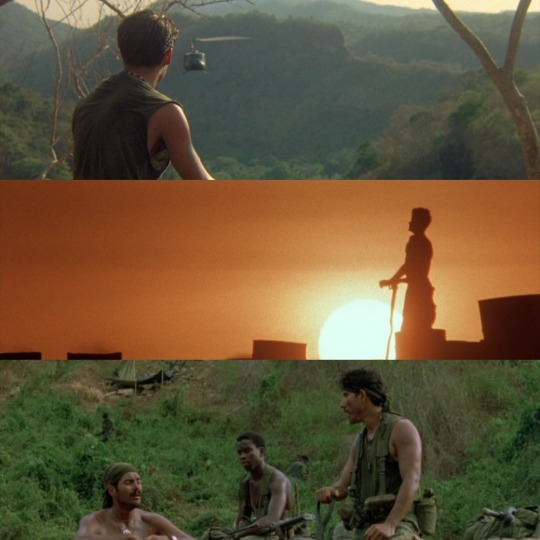
Platoon (1986, Oliver Stone)
24/03/2024
Platoon is a 1986 film, written and directed by Oliver Stone, which deals with his time in Vietnam as a volunteer during the war and is inspired by the real experiences the director had between 1967 and 1971 during his military service.
The film won 4 Oscars out of 8 nominations and Oliver Stone was also awarded the Silver Bear in Berlin as best director. In 1998 the American Film Institute placed it in eighty-third place in the ranking of the one hundred best American films of all time, while ten years later, in the updated list, it dropped to eighty-sixth place. In 2019, it was chosen for preservation in the National Film Registry of the United States Library of Congress.
The bloodiest episode, as in many other films dealing with the Vietnam War, is inspired by the most atrocious event of that conflict, known to history as the My Lai massacre, in which American soldiers committed atrocities including rape of very young girls, indiscriminate killings of innocent civilians, destruction of the homes and resources of the inhabitants, believed to be allies of the Viet Cong, despite there being no evidence. From this perspective, the figure of the platoon commander, Lieutenant Wolfe, both for his inability to control his men and for other characteristics, can be traced back to the main person responsible for My Lai, the then US Army Lieutenant William Calley, convicted to several years of military detention for that very affair.
Due to an error by Lieutenant Wolfe, who gives wrong coordinates via radio, the platoon is decimated by friendly artillery.
In the last war action of his volunteer service, Chris escapes a deadly ambush by the Viet Cong who almost completely annihilate the platoon and the subsequent American bombing with napalm.
Initially Hollywood snubs the script as many producers are of the opinion that what three is to say about the Vietnam War has already been reported in highly successful films such as Apocalypse Now and The Deer Hunter, however the strength of Stone's script still attracts some producers who see enormous potential in him. He was then assigned to write a screenplay for another film, Stone accepted and wrote Midnight Express in 1977, thanks to which he won the Oscar for best non-original screenplay (first statuette for Stone) a fact that made all of Hollywood understand the Stone's enormous potential; it was therefore not difficult for him to find the producer to begin work on Platoon.
The film was shot, following the great example of Apocalypse Now, director Francis Ford Coppola's masterpiece, on the island of Luzon, in the Philippines, starting in February 1986. The film's production was almost canceled due to the political upheavals in country, due to Ferdinand Marcos, dictator of the country. Upon arrival in the Philippines, the cast members underwent a two-week course of intensive training by Dale Dye (former Marine captain during the Vietnam War and interpreter of Captain Harris), during which they had to dig trenches and suffer forced marches and night "ambushes".
#platoon#film#1986#oliver stone#vietnam#vietnam war#1967#1971#academy awards#berlin international film festival#berlin#1998#american film institute#AFI's 100 Years 100 Movies#2019#national film registry#library of congress#united states#My Lai massacre#William Calley#friendly fire#Napalm#apocalypse now#the deer hunter#midnight express#Academy Award for Best Adapted Screenplay#francis ford coppola#luzon#philippines#ferdinand marcos
20 notes
·
View notes
Text
Couch surfer in his 30s. Oscar winner in his 40s. Why the whole world wants Taika
**Notes: This is very long post!**
Good Weekend
In his 30s, he was sleeping on couches. By his 40s, he’d directed a Kiwi classic, taken a Marvel movie to billion-dollar success, and won an Oscar. Meet Taika Waititi, king of the oddball – and one of New Zealand’s most original creative exports.
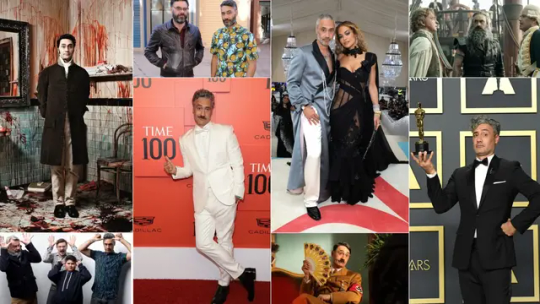
Taika Waititi: “Be a nice person and live a good life. And just don’t be an arsehole.”
The good news? Taika Waititi is still alive. I wasn’t sure. The screen we were speaking through jolted savagely a few minutes ago, with a cacophonous bang and a confused yelp, then radio silence. Now the Kiwi filmmaker is back, grinning like a loon: “I just broke the f---ing table, bro!”
Come again? “I just smashed this f---ing table and glass flew everywhere. It’s one of those old annoying colonial tables. It goes like this – see that?” Waititi says, holding up a folding furniture leg. “I hit the mechanism and it wasn’t locked. Anyway …”
I’m glad he’s fine. The stuff he’s been saying from his London hotel room could incur biblical wrath. We’re talking about his latest project, Next Goal Wins, a movie about the American Samoa soccer team’s quest to score a solitary goal, 10 years after suffering the worst loss in the game’s international history – a 31-0 ignominy to Australia – but our chat strays into spirituality, then faith, then religion.
“I don’t personally believe in a big guy sitting on a cloud judging everyone, but that’s just me,” Waititi says, deadpan. “Because I’m a grown-up.”
This is the way his interview answers often unfold. Waititi addresses your topic – dogma turns good people bad, he says, yet belief itself is worth lauding – but bookends every response with a conspiratorial nudge, wink, joke or poke. “Regardless of whether it’s some guy living on a cloud, or some other deity that you’ve made up – and they’re all made up – the message across the board is the same, and it’s important: Be a nice person, and live a good life. And just don’t be an arsehole!”
Not being an arsehole seems to have served Waititi, 48, well. Once a national treasure and indie darling (through the quirky tenderness of his breakout New Zealand films Boy in 2010 and Hunt for the Wilderpeople in 2016), Waititi then became a star of both the global box office (through his 2017 entry into the Marvel Universe, Thor: Ragnarok, which grossed more than $1.3 billion worldwide) and then the Academy Awards (winning the 2020 best adapted screenplay Oscar for his subversive Holocaust dramedy JoJo Rabbit, in which he played an imaginary Hitler).
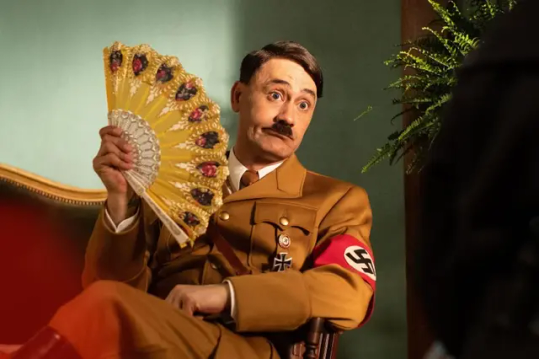
Waititi playing Adolf Hitler in the 2019 movie JoJo Rabbit. (Alamy)
A handsome devil with undeniable roguish charm, Waititi also slid seamlessly into style-icon status (attending this year’s Met Gala shirtless, in a floor-length gunmetal-grey Atelier Prabal Gurung wrap coat, with pendulous pearl necklaces), as well as becoming his own brand (releasing an eponymous line of canned coffee drinks) and bona fide Hollywood A-lister (he was introduced to his second wife, British singer Rita Ora, by actor Robert Pattinson at a barbecue).
Putting that platform to use, Waititi is an Indigenous pioneer and mentor, too, co-creating the critically acclaimed TV series Reservation Dogs, while co-founding the Piki Films production company, committed to promoting the next generation of storytellers – a mission that might sound all weighty and worthy, yet Waititi’s new wave of First Nations work is never earnest, always mixing hurt with heart and howling humour.
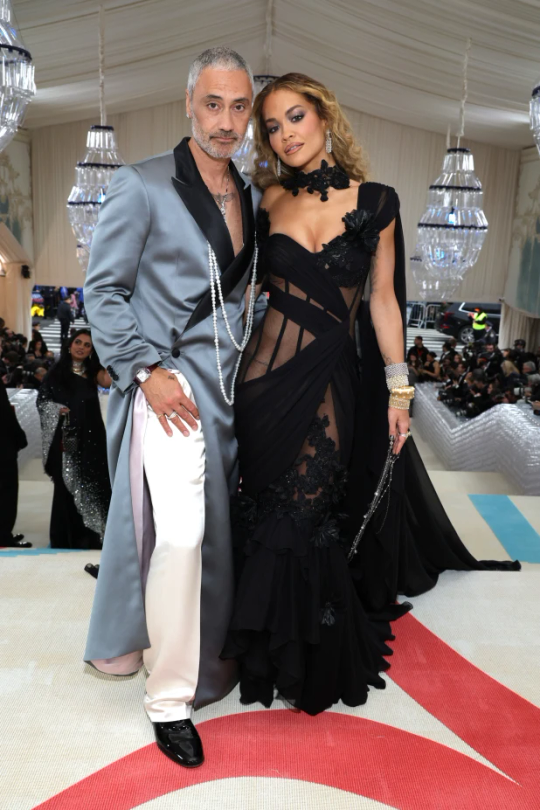
Waititi with wife Rita Ora at the 2023 Met Gala in May. (Getty Images)
Makes sense. Waititi is a byproduct of “the weirdest coupling ever” – his late Maori father from the Te Whanau-a-Apanui tribe was an artist, farmer and “Satan’s Slaves” bikie gang founder, while his Wellington schoolteacher mum descended from Russian Jews, although he’s not devout about her faith. (“No, I don’t practise,” he confirms. “I’m just good at everything, straight away.”)
He’s remained loyally tethered to his origin story, too – and to a cadre of creative Kiwi mates, including actors Jemaine Clement and Rhys Darby – never forgetting that not long before the actor/writer/producer/director was an industry maven, he was a penniless painter/photographer/ musician/comedian.
With no set title and no fixed address, he’s seemingly happy to be everything, everywhere (to everyone) all at once. “‘The universe’ is bandied around a lot these days, but I do believe in the kind of connective tissue of the universe, and the energy that – scientifically – we are made up of a bunch of atoms that are bouncing around off each other, and some of the atoms are just squished together a bit tighter than others,” he says, smiling. “We’re all made of the same stardust, and that’s pretty special.”
-----------------------------------------------
We’ve caught Waititi in a somewhat relaxed moment, right before the screen actors’ and media artists’ strike ends. He’s sensitive to the struggle but doesn’t deny enjoying the break. “I spent a lot of time thinking about writing, and not writing, and having a nice holiday,” he tells Good Weekend. “Honestly, it was a good chance just to recombobulate.”
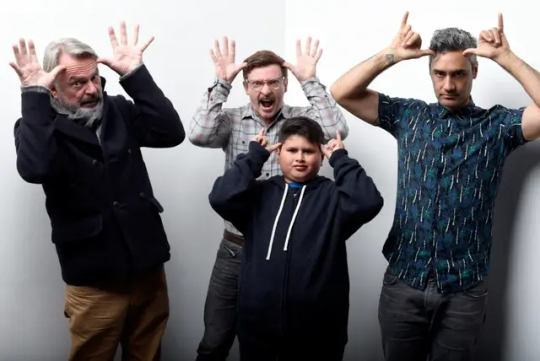
Waititi, at right, with Hunt for the Wilderpeople actors, from left, Sam Neill, Rhys Darby and Julian Dennison. (Getty Images)
It’s mid-October, and he’s just headed to Paris to watch his beloved All Blacks in the Rugby World Cup. He’s deeply obsessed with the game, and sport in general. “Humans spend all of our time knowing what’s going to happen with our day. There’s no surprises any more. We’ve become quite stagnant. And I think that’s why people love sport, because of the air of unpredictability,” he says. “It’s the last great arena entertainment.”
The main filmic touchstone for Next Goal Wins (which premieres in Australian cinemas on New Year’s Day) would be Cool Runnings (1993), the unlikely true story of a Jamaican bobsled team, but Waititi also draws from genre classics such as Any Given Sunday and Rocky, sampling trusted tropes like the musical training montage. (His best one is set to Everybody Wants to Rule the World by Tears for Fears.)
Filming in Hawaii was an uplifting experience for the self-described Polynesian Jew. “It wasn’t about death, or people being cruel to each other. Thematically, it was this simple idea, of getting a small win, and winning the game wasn’t even their goal – their goal was to get a goal,” he says. “It was a really sweet backbone.”
Waititi understands this because, growing up, he was as much an athlete as a nerd, fooling around with softball and soccer before discovering rugby league, then union. “There’s something about doing exercise when you don’t know you’re doing exercise,” he enthuses. “It’s all about the fun of throwing a ball around and trying to achieve something together.” (Whenever Waititi is in Auckland he joins his mates in a long-running weekend game of touch rugby. “And then throughout the week I work out every day. Obviously. I mean, look at me.”)
Auckland is where his kids live, too, so he spends as much time there as possible. Waititi met his first wife, producer Chelsea Winstanley, on the set of Boy in 2010, and they had two daughters, Matewa Kiritapu, 8, and his firstborn, Te Kainga O’Te Hinekahu, 11. (The latter is a derivative of his grandmother’s name, but he jokes with American friends that it means “Resurrection of Tupac” or “Mazda RX7″) Waititi and Winstanley split in about 2018, and he married the pop star Ora in 2022.
He offers a novel method for balancing work with parenthood … “Look, you just abandon them, and know that the experience will make them harder individuals later on in life. And it’s their problem,” he says. “I’m going to give them all of the things that they need, and I’m going to leave behind a decent bank account for their therapy, and they will be just like me, and the cycle will continue.”
Jokes aside – I think he’s joking – school holidays are always his, and he brings the girls onto the set of every movie he makes. “They know enough not to get in the way or touch anything that looks like it could kill you, and they know to be respectful and quiet when they need to. But they’re just very comfortable around filmmakers, which I’m really happy about, because eventually I hope they will get into the industry. One more year,” he laughs, “then they can leave school and come work for Dad.”
Theirs is certainly a different childhood than his. Growing up, he was a product of two worlds. His given names, for instance, were based on his appearance at birth: “Taika David” if he looked Maori (after his Maori grandfather) and “David Taika” if he looked Pakeha (after his white grandfather). His parents split when he was five, so he bounced between his dad’s place in Waihau Bay, where he went by the surname Waititi, and his mum, eight hours drive away in Wellington, where he went by Cohen (the last name on his birth certificate and passport).
Waititi was precocious, even charismatic. His mother Robin once told Radio New Zealand that people always wanted to know him, even as an infant: “I’d be on a bus with him, and he was that kind of baby who smiled at people, and next thing you know they’re saying, ‘Can I hold your baby?’ He’s always been a charmer to the public eye.”
He describes himself as a cool, sporty, good-looking nerd, raised on whatever pop culture screened on the two TV channels New Zealand offered in the early 1980s, from M*A*S*H and Taxi to Eddie Murphy and Michael Jackson. He was well-read, too. When punished by his mum, he would likely be forced to analyse a set of William Blake poems.
He puts on a whimpering voice to describe their finances – “We didn’t have much monneeey” – explaining how his mum spent her days in the classroom but also worked in pubs, where he would sit sipping a raspberry lemonade, doodling drawings and writing stories. She took in ironing and cleaned houses; he would help out, learning valuable lessons he imparts to his kids. “And to random people who come to my house,” he says. “I’ll say, ‘Here’s a novel idea, wash this dish,’ but people don’t know how to do anything these days.”
“Every single character I’ve ever written has been based on someone I’ve known or met or a story I’ve stolen from someone.” - Taika Waititi
He loved entertaining others, clearly, but also himself, recording little improvised radio plays on a tape deck – his own offbeat versions of ET and Indiana Jones and Star Wars. “Great free stuff where you don’t have any idea what the story is as you’re doing it,” he says. “You’re just sort of making it up and enjoying the freedom of playing god in this world where you can make people and characters do whatever you want.”
His other sphere of influence lay in Raukokore, the tiny town where his father lived. Although Boy is not autobiographical, it’s deeply personal insofar as it’s filmed in the house where he grew up, and where he lived a life similar to that portrayed in the story, surrounded by his recurring archetypes: warm grandmothers and worldly kids; staunch, stoic mums; and silly, stunted men. “Every single character I’ve ever written has been based on someone I’ve known or met,” he says, “or a story I’ve stolen from someone.”
He grew to love drawing and painting, obsessed early on with reproducing the Sistine Chapel. During a 2011 TED Talk on creativity, Waititi describes his odd subject matter, from swastikas and fawns to a picture of an old lady going for a walk … upon a sword … with Robocop. “My father was an outsider artist, even though he wouldn’t know what that meant,” Waititi told the audience in Doha. “I love the naive. I love people who can see things through an innocent viewpoint. It’s inspiring.”
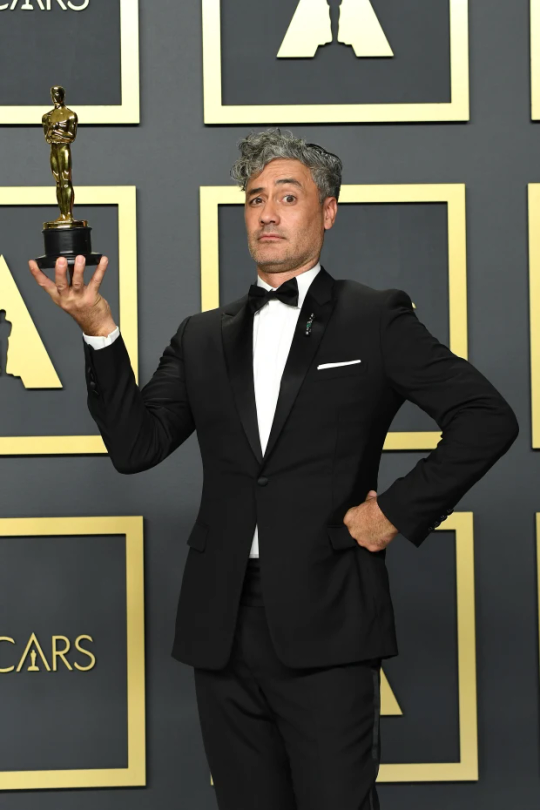
After winning Best Adapted Screenplay Academy Award for JoJo Rabbit in 2020. (Getty Images)
It was an interesting time in New Zealand, too – a coming-of-age decade in which the Maori were rediscovering their culture. His area was poor, “but only financially,” he says. “It’s very rich in terms of the people and the culture.” He learned kapa haka – the songs, dances and chants performed by competing tribes at cultural events, or to honour people at funerals and graduations – weddings, parties, anything. “Man, any excuse,” he explains. “A big part of doing them is to uplift your spirits.”
Photography was a passion, so I ask what he shot. “Just my penis. I sent them to people, but we didn’t have phones, so I would print them out, post them. One of the first dick pics,” he says. Actually, his lens was trained on regular people. He watches us still – in airports, restaurants. “Other times late at night, from a tree. Whatever it takes to get the story. You know that.”
He went to the Wellington state school Onslow College and did plays like Androcles and the Lion, A Midsummer Night’s Dream and The Crucible. His crew of arty students eventually ended up on stage at Bats Theatre in the city, where they would perform haphazard comedy shows for years.
“Taika was always rebellious and wild in his comedy, which I loved,” says his high school mate Jackie van Beek, who became a longtime collaborator, including working with Waititi on a Tourism New Zealand campaign this year. “I remember he went through a phase of turning up in bars around town wearing wigs, and you’d try and sit down and have a drink with him but he’d be doing some weird character that would invariably turn up in some show down the track.”
He met more like-minded peers at Victoria University, including Jemaine Clement (who’d later become co-creator of Flight of the Conchords). During a 2019 chat with actor Elijah Wood, Waititi describes he and Clement clocking one another from opposite sides of the library one day: a pair of Maoris experiencing hate at first sight, based on a mutual suspicion of cultural appropriation. (Clement was wearing a traditional tapa cloth Samoan shirt, and Waititi was like: “This motherf---er’s not Samoan.” Meanwhile, Waititi was wearing a Rastafarian beanie, and Clement was like, “This motherf---er’s not Jamaican.”)
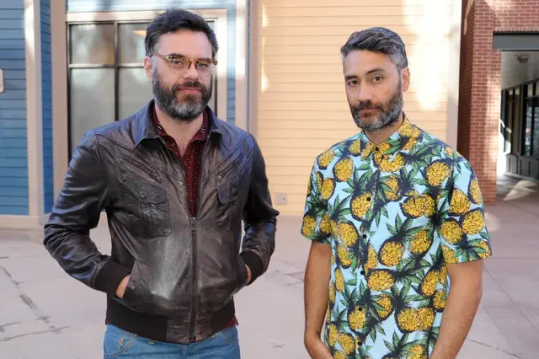
With Jemaine Clement in 2014. (Getty Images)
But they eventually bonded over Blackadder and Fawlty Towers, and especially Kenny Everett, and did comedy shows together everywhere from Edinburgh to Melbourne. Waititi was almost itinerant, spending months at a time busking, or living in a commune in Berlin. He acted in a few small films, and then – while playing a stripper on a bad TV show – realised he wanted to try life behind the camera. “I became tired of being told what to do and ordered around,” he told Wellington’s Dominion Post in 2004. “I remember sitting around in the green room in my G-string thinking, ‘Why am I doing this? Just helping someone else to realise their dream.’ ”
He did two strong short films, then directed his first feature – Eagle vs Shark (2007) – when he was 32. He brought his mates along (Clement, starring with Waititi’s then-girlfriend Loren Horsley), setting something of a pattern in his career: hiring friends instead of constantly navigating new working relationships. “If you look at things I’m doing,” he tells me, “there’s always a few common denominators.”
Sam Neill says Waititi is the exemplar of a new New Zealand humour. “The basis of it is this: we’re just a little bit crap at things.”
This gang of collaborators shares a common Kiwi vibe, too, which his longtime friend, actor Rhys Darby, once coined “the comedy of the mundane”. Their new TV show, Our Flag Means Death, for example, leans heavily into the mundanity of pirate life – what happens on those long days at sea when the crew aren’t unsheathing swords from scabbards or burying treasure.
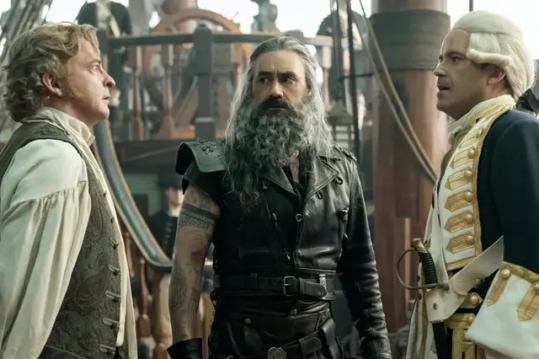
Waititi plays pirate captain Blackbeard, centre, in Our Flag Means Death, with Rhys Darby, left, and Rory Kinnear. (Google Images)
Sam Neill, who first met Waititi when starring in Hunt for the Wilderpeople, says Waititi is the exemplar of a new New Zealand humour. “And I think the basis of it is this,” says Neill. “We’re just a little bit crap at things, and that in itself is funny.” After all, Neill asks, what is What We Do in The Shadows (2014) if not a film (then later a TV show) about a bunch of vampires who are pretty crap at being vampires, living in a pretty crappy house, not quite getting busted by crappy local cops? “New Zealand often gets named as the least corrupt country in the world, and I think it’s just that we would be pretty crap at being corrupt,” Neill says. “We don’t have the capacity for it.”
Waititi’s whimsy also spurns the dominant on-screen oeuvre of his homeland – the so-called “cinema of unease” exemplified by the brutality of Once Were Warriors (1994) and the emotional peril of The Piano (1993). Waititi still explores pathos and pain, but through laughter and weirdness. “Taika feels to me like an antidote to that dark aspect, and a gift somehow,” Neill says. “And I’m grateful for that.”
-----------------------------------------------
Something happened to Taika Waititi when he was about 11 – something he doesn’t go into with Good Weekend, but which he considered a betrayal by the adults in his life. He mentioned it only recently – not the moment itself, but the lesson he learnt: “That you cannot and must not rely on grown-ups to help you – you’re basically in the world alone, and you’re gonna die alone, and you’ve just gotta make it all for yourself,” he told Irish podcast host James Brown. “I basically never forgave people in positions of responsibility.”
What does that mean in his work? First, his finest films tend to reflect the clarity of mind possessed by children, and the unseen worlds they create – fantasies conjured up as a way to understand or overcome. (His mum once summed up the main message of Boy: “The unconditional love you get from your children, and how many of us waste that, and don’t know what we’ve got.”)
Second, he’s suited to movie-making – “Russian roulette with art” – because he’s drawn to disruptive force and chaos. And that in turn produces creative defiance: allowing him to reinvigorate the Marvel Universe by making superheroes fallible, or tell a Holocaust story by making fun of Hitler. “Whenever I have to deal with someone who’s a boss, or in charge, I challenge them,” he told Brown, “and I really do take whatever they say with a pinch of salt.”
It’s no surprise then that Waititi was comfortable leaping from independent films to the vast complexity of Hollywood blockbusters. He loves the challenge of coordinating a thousand interlocking parts, requiring an army of experts in vocations as diverse as construction, sound, art, performance and logistics. “I delegate a lot,” he says, “and share the load with a lot of people.”
“This is a cool concept, being able to afford whatever I want, as opposed to sleeping on couches until I was 35.” - Taika Waititi
But the buck stops with him. Time magazine named Waititi one of its Most Influential 100 People of 2022. “You can tell that a film was made by Taika Waititi the same way you can tell a piece was painted by Picasso,” wrote Sacha Baron Cohen. Compassionate but comic. Satirical but watchable. Rockstar but auteur. “Actually, sorry, but this guy’s really starting to piss me off,” Cohen concluded. “Can someone else write this piece?”
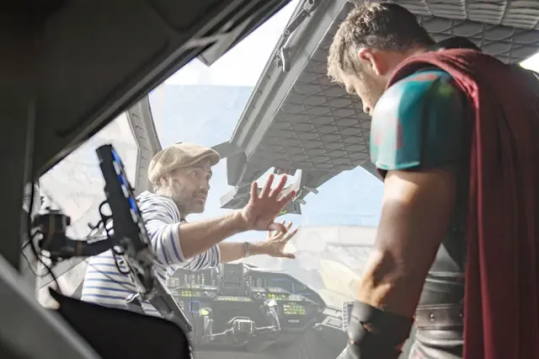
Directing Chris Hemsworth in 2017 in Thor: Ragnarok, which grossed more than $1.3 billion at the box office. (Alamy)
I’m curious to know how he stays grounded amid such adulation. Coming into the game late, he says, helped immensely. After all, Waititi was 40 by the time he left New Zealand to do Thor: Ragnarok. “If you let things go to your head, then it means you’ve struggled to find out who you are,” he says. “But I’ve always felt very comfortable with who I am.” Hollywood access and acclaim – and the pay cheques – don’t erase memories of poverty, either. “It’s more like, ‘Oh, this is a cool concept, being able to afford whatever I want, as opposed to sleeping on couches until I was 35.’ ” Small towns and strong tribes keep him in check, too. “You know you can’t piss around and be a fool, because you’re going to embarrass your family,” he says. “Hasn’t stopped me, though.”
Sam Neill says there was never any doubt Waititi would be able to steer a major movie with energy and imagination. “It’s no accident that the whole world wants Taika,” he says. “But his seductiveness comes with its own dangers. You can spread yourself a bit thin. The temptation will be to do more, more, more. That’ll be interesting to watch.”
Indeed, I find myself vicariously stressed out over the list of potential projects in Waititi’s future. A Roald Dahl animated series for Netflix. An Apple TV show based on the 1981 film Time Bandits. A sequel to What We Do In The Shadows. A reboot of Flash Gordon. A gonzo horror comedy, The Auteur, starring Jude Law. Adapting a cult graphic novel, The Incal, as a feature. A streaming series based on the novel Interior Chinatown. A film based on a Kazuo Ishiguro bestseller. Plus bringing to life the wildly popular Akira comic books. Oh, and for good measure, a new instalment of Star Wars, which he’s already warned the world will be … different.
“It’s going to change things,” he told Good Morning America. “It’s going to change what you guys know and expect.”
Did I say I was stressed for Waititi? I meant physically sick.
“Well…” he qualifies, “some of those things I’m just producing, so I come up with an idea or someone comes to me with an idea, and I shape how ‘it’s this kind of show’ and ‘here’s how we can get it made.’ It’s easier for me to have a part in those things and feel like I’ve had a meaningful role in the creative process, but also not having to do what I’ve always done, which is trying to control everything.”
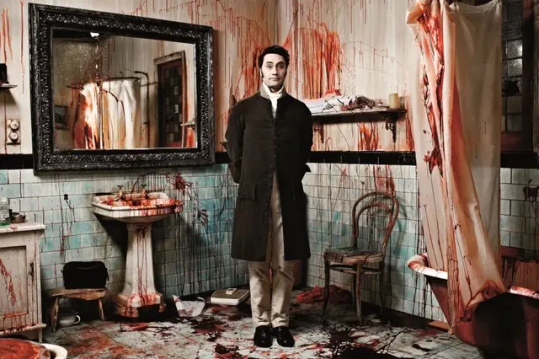
In the 2014 mockumentary horror film What We Do in the Shadows, which he co-directed with Jemaine Clement. (Alamy)
What about moving away from the niche New Zealand settings he represented so well in his early work? How does he stay connected to his roots? “I think you just need to know where you’re from,” he says, “and just don’t forget that.”
They certainly haven’t forgotten him.
Jasmin McSweeney sits in her office at the New Zealand Film Commission in Wellington, surrounded by promotional posters Waititi signed for her two decades ago, when she was tasked with promoting his nascent talent. Now the organisation’s marketing chief, she talks to me after visiting the heart of thriving “Wellywood”, overseeing the traditional karakia prayer on the set of a new movie starring Geoffrey Rush.
Waititi isn’t the first great Kiwi filmmaker – dual Oscar-winner Jane Campion and blockbuster king Peter Jackson come to mind – yet his particular ascendance, she says, has spurred unparalleled enthusiasm. “Taika gave everyone here confidence. He always says, ‘Don’t sit around waiting for people to say, you can do this.’ Just do it, because he just did it. That’s the Taika effect.”
-----------------------------------------------
Taika David Waititi is known for wearing everything from technicolour dreamcoats to pineapple print rompers, and today he’s wearing a roomy teal and white Isabel Marant jumper. The mohair garment has the same wispy frizz as his hair, which curls like a wave of grey steel wool, and connects with a shorn salty beard.
A stylish silver fox, it wouldn’t surprise anyone if he suddenly announced he was launching a fashion label. He’s definitely a commercial animal, to the point of directing television commercials for Coke and Amazon, along with a fabulous 2023 spot for Belvedere vodka starring Daniel Craig. He also joined forces with a beverage company in Finland (where “taika” means “magic”) to release his coffee drinks. Announcing the partnership on social media, he flagged that he would be doing more of this kind of stuff, too (“Soz not soz”).
Waititi has long been sick of reverent portrayals of Indigenous people talking to spirits.
There’s substance behind the swank. Fashion is a creative outlet but he’s also bought sewing machines in the past with the intention of designing and making clothes, and comes from a family of tailors. “I learnt how to sew a button on when I was very young,” he says. “I learnt how to fix holes or patches in your clothes, and darn things.”
And while he gallivants around the globe watching Wimbledon or modelling for Hermès at New York Fashion Week, all that glamour belies a depth of purpose, particularly when it comes to Indigenous representation.
There’s a moment in his new movie where a Samoan player realises that their Dutch coach, played by Michael Fassbender, is emotionally struggling, and he offers a lament for white people: “They need us.” I can’t help but think Waititi meant something more by that line – maybe that First Nations people have wisdom to offer if others will just listen?
“Weeelllll, a little bit …” he says – but from his intonation, and what he says next, I’m dead wrong. Waititi has long been sick of reverent portrayals of Indigenous people talking to kehua (spirits), or riding a ghost waka (phantom canoe), or playing a flute on a mountain. “Always the boring characters,” he says. “They’ve got no real contemporary relationship with the world, because they’re always living in the past in their spiritual ways.”

A scene from Next Goal Wins, filmed earlier this year. (Alamy)
He’s part of a vanguard consciously poking fun at those stereotypes. Another is the Navajo writer and director Billy Luther, who met Waititi at Sundance Film Festival back in 2003, along with Reservation Dogs co-creator Sterlin Harjo. “We were this group of outsiders trying to make films, when nobody was really biting,” says Luther. “It was a different time. The really cool thing about it now is we’re all working. We persevered. We didn’t give up. We slept on each other’s couches and hung out. It’s like family.”
Waititi has power now, and is known for using Indigenous interns wherever possible (“because there weren’t those opportunities when I was growing up”), making important introductions, offering feedback on scripts, and lending his name to projects through executive producer credits, too, which he did for Luther’s new feature film, Frybread Face and Me (2023).
He called Luther back from the set of Thor: Love and Thunder (2022) to offer advice on working with child actors – “Don’t box them into the characters you’ve created,” he said, “let them naturally figure it out on their own” – but it’s definitely harder to get Waititi on the phone these days. “He’s a little bitch,” Luther says, laughing. “Nah, there’s nothing like him. He’s a genius. You just knew he was going to be something. I just knew it. He’s my brother.“
I’ve been asked to explicitly avoid political questions in this interview, probably because Waititi tends to back so many causes, from child poverty and teenage suicide to a campaign protesting offshore gas and oil exploration near his tribal lands. But it’s hard to ignore his recent Instagram post, sharing a viral video about the Voice to Parliament referendum starring Indigenous Aussie rapper Adam Briggs. After all, we speak only two days after the proposal is defeated. “Yeah, sad to say but, Australia, you really shat the bed on that one,” Waititi says, pausing. “But go see my movie!”
About that movie – the early reviews aren’t great. IndieWire called it a misfire, too wrapped in its quirks to develop its arcs, with Waititi’s directorial voice drowning out his characters, while The Guardian called it “a shoddily made and strikingly unfunny attempt to tell an interesting story in an uninteresting way”. I want to know how he moves past that kind of criticism. “For a start, I never read reviews,” he says, concerned only with the opinion of people who paid for admission, never professional appraisals. “It’s not important to me. I know I’m good at what I do.”
Criticism that Indigenous concepts weren’t sufficiently explained in Next Goal Wins gets his back up a little, though. The film’s protagonist, Jaiyah Saelua, the first transgender football player in a FIFA World Cup qualifying match, is fa’afafine – an American Samoan identifier for someone with fluid genders – but there wasn’t much exposition of this concept in the film. “That’s not my job,” Waititi says. “It’s not a movie where I have to explain every facet of Samoan culture to an audience. Our job is to retain our culture, and present a story that’s inherently Polynesian, and if you don’t like it, you can go and watch any number of those other movies out there, 99 per cent of which are terrible.”
*notes: (there is video clip in the article)
Waititi sounds momentarily cranky, but he’s mostly unflappable and hilarious. He’s the kind of guy who prefers “Correctumundo bro!” to “Yes”. When our video connection is too laggy, he plays up to it by periodically pretending to be frozen, sitting perfectly still, mouth open, his big shifting eyeballs the only giveaway.
He’s at his best on set. Saelua sat next to him in Honolulu while filming the joyous soccer sequences. “He’s so chill. He just let the actors do their thing, giving them creative freedom, barely interjecting unless it was something important. His style matches the vibe of the Pacific people. We’re a very funny people. We like to laugh. He just fit perfectly.”
People do seem to love working alongside him, citing his ability to make productions fresh and unpredictable and funny. Chris Hemsworth once said that Waititi’s favourite gag is to “forget” that his microphone is switched on, so he can go on a pantomime rant for all to hear – usually about his disastrous Australian lead actor – only to “remember” that he’s wired and the whole crew is listening.
“I wouldn’t know about that, because I don’t listen to what other people say about anything – I’ve told you this,” Waititi says. “I just try to have fun when there’s time to have fun. And when you do that, and you bring people together, they’re more willing to go the extra mile for you, and they’re more willing to believe in the thing that you’re trying to do.”
Yes, he plays music between takes, and dances out of his director’s chair, but it’s really all about relaxing amid the immense pressure and intense privilege of making movies. “Do you know how hard it is just to get anything financed or green-lit, then getting a crew, getting producers to put all the pieces together, and then making it to set?” Waititi asks. “It’s a real gift, even to be working, and I feel like I have to remind people of that: enjoy this moment.”
Source: The Age
By: Konrad Marshall (December 1, 2023)
198 notes
·
View notes
Text
‘A Nice Indian Boy’ will be released theatrically early next year, and then will be available on streaming (no further details available yet)
Jonathan Groff singing Bollywood tunes is the centerpiece of “A Nice Indian Boy,” a groundbreaking gay rom-com that’s heating up the BFI London Film Festival.
Director Roshan Sethi and stars Groff (“Mindhunter,” “Glee,” “Doctor Who”) and Karan Soni (the “Deadpool” franchise) are challenging Hollywood norms with their cross-cultural love story, which debuted at SXSW. It aims to bring a fresh perspective to both LGBTQ+ and South Asian representation on screen.
The genesis of the project traces back to 2019, when Levantine Films optioned Madhuri Shekar’s play of the same name and Eric Randall adapted it as a screenplay. Sethi came aboard in 2021 after the producers saw his previous film “7 Days.” He then approached his real-life partner Soni to co-star. Groff signed on after watching “7 Days.”
“I do think what’s interesting about the current era of ‘diversity films’ is that they tend to be very homogeneous. They’re all Asian or they’re all Indian, or they’re all black or they’re all white, in the exact opposite case, and the reality of our world is that we’re all mixed up with each other in tangled, messy ways. And this movie very much reflects that, because you have a meeting of cultures,” Sethi says.
For Groff, who plays a white character adopted by Indian parents, the role required immersing himself in a culture he was largely unfamiliar with. “I had never seen a Bollywood movie. I didn’t know anything about this culture in general,” Groff says. His preparation included watching the Bollywood classic “Dilwale Dulhania Le Jayenge” (DDLJ) to nail a pivotal musical moment in the film.
This scene, featuring Groff’s character singing the evergreen “Tujhe Dekha To Ye Jana Sanam” from “DDLJ,” is a highlight of the film. “I didn’t know that he was going to do, like, a falsetto, la, la, la, la, la – that trilling thing,” Sethi says. “Everyone was turned on,” Soni adds.
Despite the cultural specificity, Groff found the family dynamics surprisingly relatable. “I, immediately from the first take of the first scene, couldn’t believe how familiar it all felt,” he says. “Even though there was a stark difference in culture, it was so heartwarming to see that families are families, no matter what culture you’re in.”
The production faced significant challenges, primarily due to a compressed timeline. Sethi reveals they had just four weeks of pre-production and a 21-day shoot with six-day weeks. “We were just like this tiny indie movie that was crammed in between these other much larger, broader circumstances,” he says, referring to Soni’s commitment to “Deadpool” and the then-looming SAG-AFTRA strike.
Financing the film also proved difficult. “We barely got this movie made. We barely found the money. We struggled for years,” Sethi says. He notes that Groff’s involvement was crucial in securing funding. “None of the Indian actors are deemed meaningful enough to obtain financing,” Sethi explains, calling Hollywood “one of the most racist industries in America.”
For Sethi, who still practices medicine, the film represents a personal milestone. “I was closeted six years ago, and now I got to make this movie, which is highly personal,” he says. “I could never have imagined when I was like, walking around the hospital as a straight doctor, watching [HBO’s] ‘Looking,’ that I was going to like be out, much less like be making this movie.”
“A Nice Indian Boy” is set for a theatrical release in the first quarter of next year, with streaming plans to follow. The filmmakers are optimistic about its commercial prospects, citing positive responses from diverse test audiences. “When we were testing the movie among audiences, the highest scoring audience was always white women,” Sethi notes.
The team hopes the film will resonate beyond niche audiences. “Part of the other issue with the so-called diverse film and representation movements is that they’ve made those movies feel like they are for niche audiences,” Sethi says. “The truth is diversity should be an opening up of storytelling where you’re finding more and more interesting and more new stories to tell people, but just vitalize art. They don’t splinter it, they don’t make it more niche. They vitalize it.”
As they prepare for the film’s wider release, the cast is moving on to new projects. Soni is set to star in the thriller “Fade to Black,” while Sethi is working on a new romantic comedy script where he’s “going back to straight people.” Groff, fresh off his Tony win for “Merrily We Roll Along” on Broadway, is returning to the Great White Way with “Just In Time,” a new musical about the life and times of singer Bobby Darin.
24 notes
·
View notes
Text
Happy Birthday To The Hottest And Most Bodacious Geeky Nerdy Bad@$$ Actress of Many Favoritable Movies and Shows of the 21st Century. The Awesome Latina Wonder Woman👩🏾🇵🇷🇨🇺🤎🧡 herself.
She is an American actress. She made her feature-film debut in the 1995 independent drama Kids. Her subsequent film roles include He Got Game (1998), Josie and the Pussycats (2001), Men in Black II (2002), The Rundown (2003), Rent (2005), Sin City (2005), Clerks II (2006), Death Proof (2007), Seven Pounds (2008), Percy Jackson & the Olympians: The Lightning Thief (2010), Unstoppable (2010), Zookeeper (2011), Trance (2013), Top Five (2014), Zombieland: Double Tap (2019), and Clerks 3 (2022). Dawson has provided voice-over work for Disney/Marvel, Warner Bros./DC Comics, and ViacomCBS's Nickelodeon unit.
Rosario Dawson was born on May 9, 1979, in New York City. Her mother, Isabel Celeste, is of Puerto Rican, Taíno, Cuban and African ancestry. Isabel was 17 years old when Rosario was born; she never married Rosario's biological father, Patrick C. Harris. When Dawson was a year old, Isabel married Greg Dawson, a construction worker. Isabel and Greg moved into a reclaimed building on East 13th Street after being approved as members of an affordable housing plan. The family later moved to Garland, Texas.
As a child, Dawson made a brief appearance on Sesame Street. At the age of 15, she was discovered on her front-porch step by photographer Larry Clark and Harmony Korine, with Korine deciding that she was perfect for a part he had written in his screenplay for the controversial 1995 film Kids.
Dawson had several roles in film and television adaptations of comic books. These include Gail in Sin City (2005) and Sin City: A Dame to Kill For (2014), Claire Temple in five of the Marvel Netflix series (2015–2018), and providing the voices of Diana Prince / Wonder Woman in the DC Animated Movie Universe and Space Jam: A New Legacy and Barbara Gordon / Batgirl in The Lego Batman Movie. In 2020, she portrayed Ahsoka Tano in the second season of The Mandalorian and The Book of Boba Fett, and stars in Disney+ original series Ahsoka. In 2021, she had a recurring role in the Dwayne Johnson autobiographical comedy series Young Rock and a main role in the Hulu miniseries Dopesick.
I always thought she was Afro Latina. Oh well
PLEASE WISH THIS MOST AWESOME & BAD@$$ LATINA AMERICAN ACTRESS OF MANY FORMS OF ENTERTAINMENT & HOT NERD 🤓 🔥
A VERY HAPPY BIRTHDAY 🎂 🥳 🎉 🎈 🎁 🎊
YOU KNOW HER
YOU SEEN HER MOVIES 🎥 , TV APPEARANCES 📺 & GEEK OUT ON SUPERHERO FILMS 🎥
& SHE IS STILL RADIANT TO THIS VERY DAY
THE 1 & THE ONLY
MS ROSARIO ISABEL DAWSON👩🏾 🇵🇷🇨🇺🤎🧡
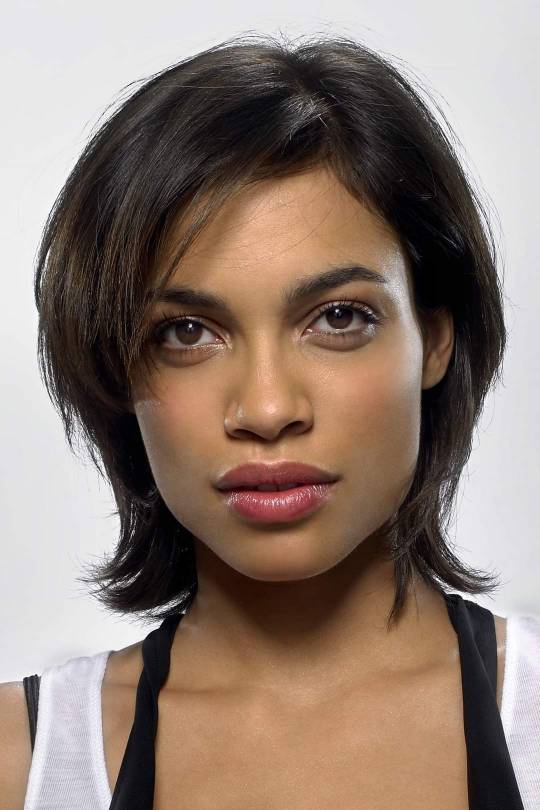
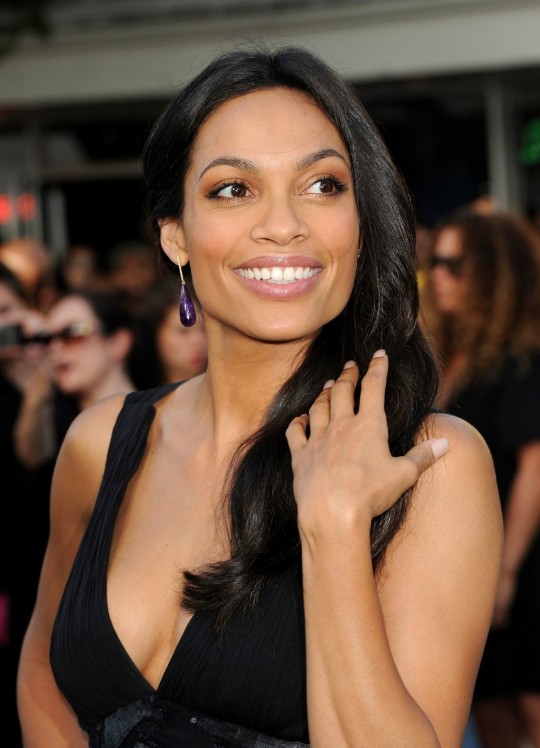
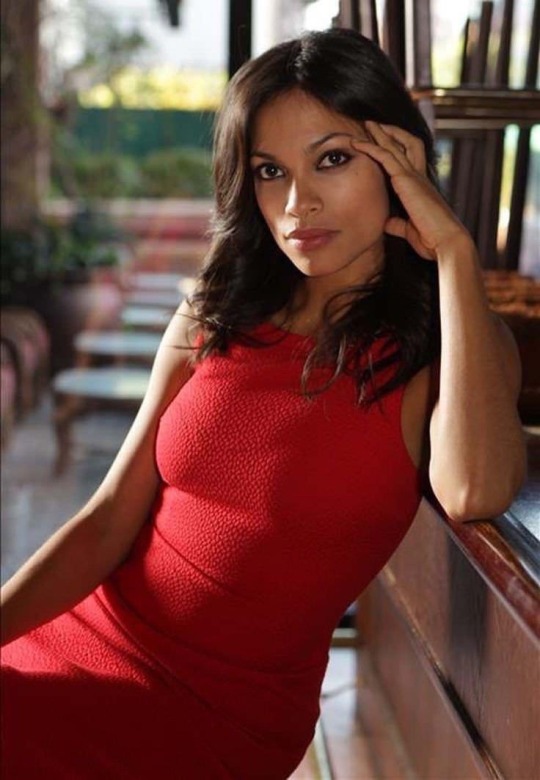
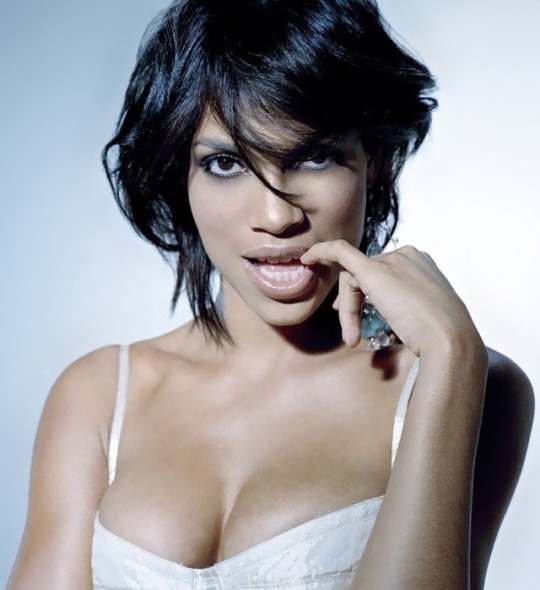

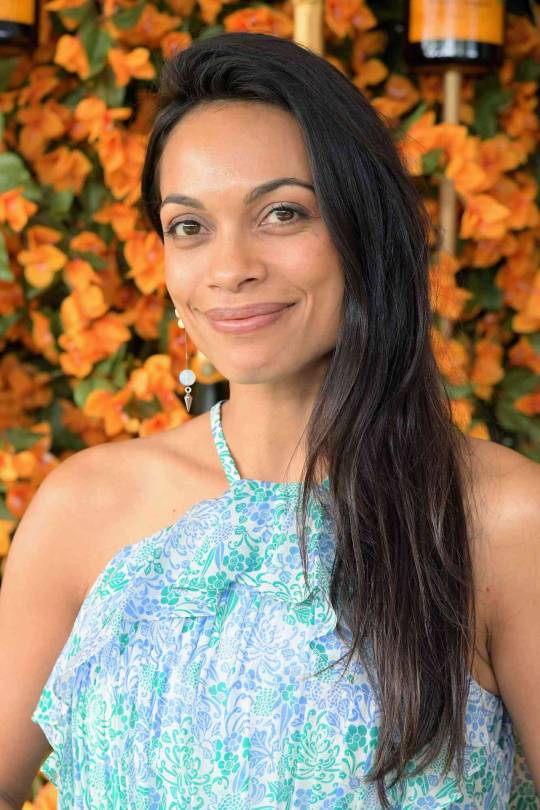

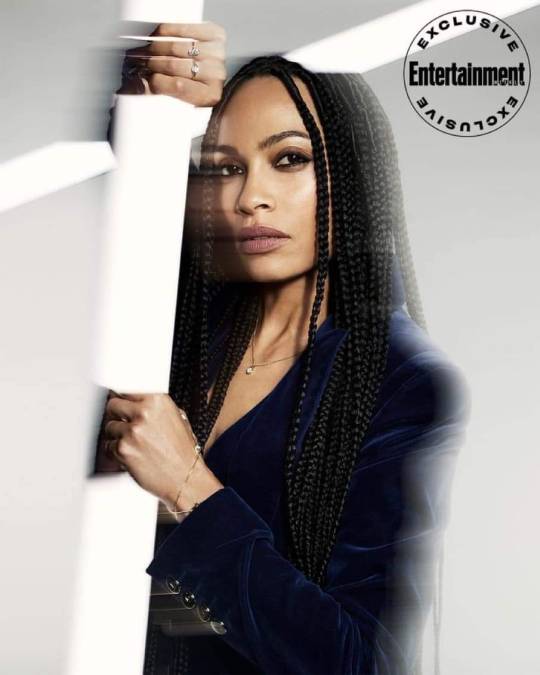
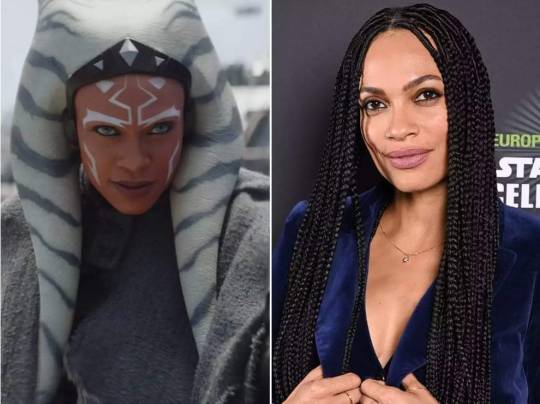
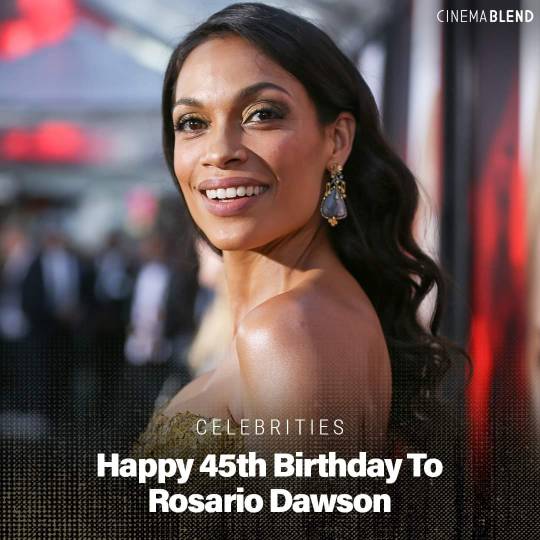
HAPPY 45TH BIRTHDAY 🎂 🥳 🎉 🎈 🎁 🎊 TO YOU MS. DAWNSON👩🏾🇵🇷🇨🇺🤎🧡 & HERE'S TO MANY MORE YEARS TO COME
#RosarioDawson
11 notes
·
View notes
Note
guess who listened to bits of the musical? (boston recording to be specific). john neville will now be my "canon" humbert though jeremy irons' version has stuck with me for a while. also, were they going off the '62 movie? because from the dialogue, it sounds like lolita was her birth name and not just humbert's nickname
John Neville was fantastic tbh! He really managed the balance between sinister and funny well in a way the movie Humberts never did. Probably also due to the better script - for which they were going off of Nabokovs movie script! He wrote the script for the 62 movie but Kubrick only kept a handful of structure points (such as opening on Quiltys murder) and rejected it otherwise. Nabokov would eventually publish it but at that point it wasn't available publicly. I assume Nabokov let Lerner have a copy to have a point of comparison for what the author eanted from a visual adaptation. There are quite a few points clearly taken from or inspired by the musical. Lolita being the name she goes by us one of them and also one of the few choices I dislike about both the screenplay and the musical. I assume it was made to avoid confusing the audience (and while I'd love to argue that that's unnecessary the average Lolita consumer in any variation has not exactly proven their intellectual merits so far). Nabokovs screenplay does mention her birth name being Dolores but seems to have Lolita as a nickname she already goes by. It does make for much easier rhyming and singing than Dolores, I'll give them that, but I still consider it a mistake. The name being specifically Humbert's imposition on her is too important to the underlying theme and something Nabokov also stressed in interviews so I would wager he wasn't happy to dumb himself down for the mass market audience either.
I don't think it could currently be changed in any new staging or adaptation of the script or musical for copyright reasons but in my opinion a sufficiently strong staging (like in the 2019 revival or a hypothetical adaptation of Nabokovs script) can work to make it less of a glaring flaw.
For personal enjoyment (not giving credit to the writing here) you could also interpret it so since we're being told the story directly by Humbert this is a choice made by him. He's telling the story directly to you with less words than the novel has and unilaterally makes her Lolita. It doesn't matter what her birth name was because in his story she is Lolita and he will not let her be anything else.
#but YAYYY lolita my love gang unite#PLEASE keep me updated on ur thoughts#feel free to dm me too!#lolita my love#lolita 1962#lolita screenplay#dolores haze#humbert humbert#vladimir nabokov#alan jay lerner#ask#anon
6 notes
·
View notes
Text
"LITTLE WOMEN" (1970) Review
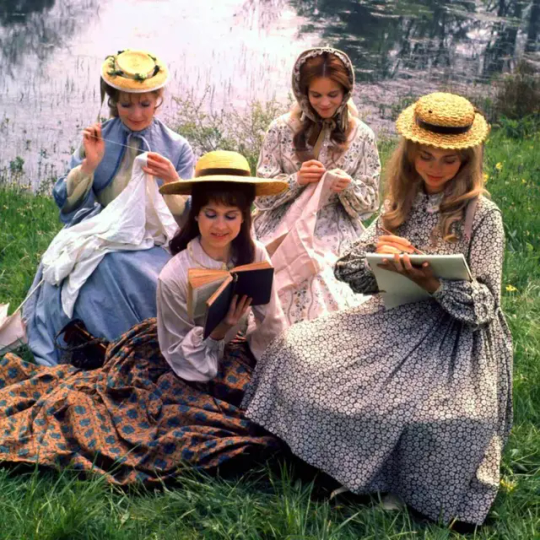
"LITTLE WOMEN" (1970) Review
It is very rare to find a British adaptation of an American novel. It is even rarer to find more than one adaptation. Louisa May Alcott's 1868 novel, "Little Women" must have been very popular with the BBC network. The latter had adapted the novel four times. Several years ago, I had seen the network's 2017 version. I thought it was the only version adapted by the BBC . . . until I had stumbled across the 1970 adaptation.
Set during the 1860s decade, "LITTLE WOMEN" told the story of the four March sisters of Concord, Massachusetts and their coming of age stories during and after the U.S. Civil War. With second daughter Josephine aka Jo serving as the story's main protagonist, the miniseries focused on the sisters' struggles with the family's diminished finances, their personal ambitions and especially their love lives. Early in the story, the March sisters become acquainted with their neighbor, one Theodore "Laurie" Lawrence, grandfather Mr. Lawrence and his tutor, John Brooke. Whereas third sister Beth develops a friendship with the elderly Mr. Lawrence, oldest sister Meg falls in love with Mr. Brooke, and the youngest Amy develops from a slightly vain and coddled child to a mature and self-assured young woman. As for Jo, the story focused on her development from a temperamental and stubborn girl, who learns to maintain her hot temper, navigate through her relationships with two men and adhere to her ambitions to become a writer.
Another surprising aspect of "LITTLE WOMEN" that I had learned was that it was the longest adaptation of Alcott's novel with a total running time of 225 minutes. This gave screenwriters Alistair Bell and Denis Constanduros to be as faithful to Alcott's novel as possible. Were they? Somewhat. The pair did take care to explore Laurie's volatile relationship with his grandfather - something that a good number of the other adaptations had failed to do. And it allowed glimpses into his growing relationship with Amy in Europe. Also, the early stages of Meg's marriage to Mr. Brooke ended up being explored, something that only the 2019 movie adaptation had repeated. I believe the miniseries did a very solid job of conveying these aspects of Alcott's novel.
But the miniseries left out Meg and Laurie's experiences at Annie Moffat's party. The miniseries also left out the sisters meeting with Laurie's English friends - something only the 2017 adaptation had included. Bell and Constanduros had changed the time period of Amy's near drowning at Walden Pond from the winter to either the spring or summer, allowing a rickety pier to send her into the pond, instead of thin ice. And it never touched on Amy's violent encounter with her schoolteacher over pickled limes. Did these aspects of the screenplay harm the production? Hmmmm . . . perhaps not. But I do feel that the miniseries' increased emphasis on the Lawrence men's relationship came dangerously close to overshadowing the March sisters' own relationships. I am relieved that the miniseries managed to focus somewhat on Jo's relationship with Professor Bhaer. However, I do have a problem with the sexist manner in which Constanduros and Bell had the professor viewed his future marriage to Jo. Whatever admiration Professor Bhaer had for Jo's writing skills seemed to fly out of the window in his anticipation of her being a good wife. Superficially, I had no problems with the brief focus on Meg and John's marriage, even if it could have been somewhat more thorough. But I believe it exposed what I believe was one of the miniseries' main problems.
"LITTLE WOMEN" did have its share of problems. Like the 1978 television adaptation, it is clear to see that it suffered somewhat from a low budget. If I must be frank, that seemed to be more obvious in this adaptation. Aside from Amy's near drowning at Walden Pond and some of European settings featuring Amy and Laurie, all other scenes had obviously been shot inside a studio. Very disappointing, considering a good number of BBC productions featured a mixture of interior and exterior shots. I found the actresses' makeup and hair - especially the latter - to be inconsistent and frankly, a big mess. Betty Aldiss' costume designs seemed solid enough, but not particularly earth shattering. Although the cast solely featured British performers, I believe a handful of them managed to handle American accents quite well - especially Stephen Turner, Stephanie Bidmead and Martin Jarvis. But despite their solid or excellent performances, the rest of the cast seemed to struggle maintaining one. And could someone please explain why three of the actresses who portrayed the March sisters seemed to be incredibly loud? Nearly every time one of them spoke, I had to turn down my television's volume. Some have explained these scenes featuring quarreling between the four sisters. They have even gone as far to claim this adaptation was the only one that featured the sisters often quarreling. Well, they would be wrong. Nearly every adaptation (I am not certain about the 1933 movie) of Alcott's novel featured quarrels between the sisters. So, this explanation does not strike me as a good excuse for the loud voices.
Judging from the previous paragraph, one would assume I have a low opinion of the majority of performances featured in "LITTLE WOMEN". Not really. Most of the performances featured in the miniseries struck me as pretty solid. Actresses Angela Down ("Jo"), Jo Rowbottom ("Meg"), Janina Faye (Amy) and Sarah Craze ("Beth") all gave solid performances and managed to capture the nuances of their individual characters in a competent manner. As I had stated earlier, I had a problem with most of them - with the exception of Craze - resorting to loud and histrionic voices in their portrayals of the March sisters at a younger age or in the case of Rowbottom, engaged in a heated quarrel. I thought Jean Anderson gave a solid performance as the stuffy Aunt March. Frederick Jaeger gave a very likeable performance as Jo's love interest, the intellectual Professor Friedrich Bhaer. And I believe the actor had a solid screen chemistry with Down. I really had a problem with actress Pat Nye, who portrayed the family's housekeeper, Hannah. Nye's handling of Hannah's American accent struck me as ridiculously exaggerated . . . to the point that her accent almost seemed Southern. Patrick Troughton, a talented actor in his own right, had more or less been wasted in his role as the family's patriarch, Mr. March. I do not believe he had spoken more than three to five lines in this production.
I can think of at least four performances that really impressed me. It seemed a pity that not one of them came from the four actresses who portrayed the sisters. Oh well. John Welsh has my vote as the second best version of Mr. James Lawrence, the March family's wealthy neighbor. I thought he did an excellent job of developing his character from a strict and curmudgeon guardian to a warm-hearted man who learned to develop a relationship with his grandson. Most portrayals of John Brooke, Meg's future husband, have never impressed me. But I must say that I found Martin Jarvis's portrayal of the character more than impressive. The actor was given an opportunity to delve more into Mr. Brooke's personality and he ended up giving one of the better performances in the miniseries. If given the chance to vote for the best performance in "LITTLE WOMEN", I would give it to Stephen Turner for his portrayal of the sisters' close friend, Theodore "Laurie" Lawrence. I suspect Turner had greatly benefited from Bell and Constanduros's script, which seemed more interested in Laurie as a character than the four leads. But judging from Turner's performance, I suspect his would have overshadowed everyone else's due to the actor's superb handling of the character. I also have to compliment Stephanie Bidmead's portrayal of the March family's matriarch, Mrs. "Marmee" March. Not only did I find her performance warm and elegant, but it also lacked the dripping sentimentality of the earlier versions and the heavy-handed attempts to make the character "modern" - relevant to today's movie and television audiences.
"LITTLE WOMEN" had its flaws. I cannot deny this. But I feel its flaws - which included a limited budget and some questionable American accents - were not enough to dismiss the nine-part miniseries as unworthy. I believe the 1970 miniseries proved to be a lot more solid and entertaining than some fans of Alcott's novel believed, thanks to Paddy Russell's competent direction, a damn good screenplay by Denis Constanduros and Alistair Bell, and a first-rate cast led by Angela Down.
#costume drama#period drama#period dramas#little women#little women 1970#louisa may alcott#little women bbc#jo march#angela down#meg march#jo rowbottom#janina faye#amy march#sarah craze#beth march#stephanie bidmead#stephen turner#martin jarvis#frederick jaeger#patrick troughton#pat nye#u.s. civil war#john welsh#paddy russell#denis constanduros#alistair bell
9 notes
·
View notes
Text
RIP David Lynch 1946-2025
This year only just begun but boy does this one hurt! Visionary of film, TV, art, and music David Lynch has died at 78. The news was announced via Lynch's Facebook page (is it is, in fact, not true - I'll be taking this down). Last year it was announced that he was homebound, but open to directing remotely.
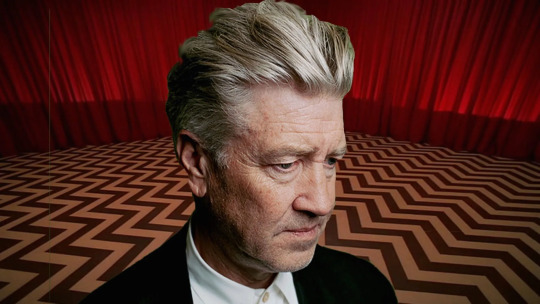
Lynch in the red room
I discovered his work around 1990 when Twin Peaks became a national phenomenon and I discovered a lot of his other work. He was truly an artist in every sense of the word. He often felt that he said so much with his work that it was hard to talk about it in interviews afterwards as the film was the final statement. In 2015, I had a screening at PhilaMOCA near where he lived during his time in Philly and they had a mural of him outside.

Eraserhead mural outside PhilaMOCA in Philadelphia
In the mid-60s, Lynch actually did a year in Boston at the School of the Museum of Fine Arts, where his roommate was actually Pete Wolf, pre-J. Geils Band. Imagine the conversations the two of them must've had!?! He eventually made his way to art school in Philadelphia. To say that environment had an impact on his work would be an understatement. I have a copy of The Short Films of David Lynch compilation, which contains a lot of his early short films made between 1967 and 1974. Even then, he was developing a unique visual style. But he truly announced himself with his feature film debut 1977's Eraserhead. It became a huge cult film, playing midnight screenings for years to come. It also influenced musicians like The Pixies and Talking Heads. I picked up a bootleg circa 2000 that was dubbed from a Japanese laserdisc, so much of my viewing experience with it is with subtitles. I lent that to a number of friends in college too. Now it is available from Criterion, but at the time, it was quite a find to score a copy and not have to go to Harvard Square at midnight to see it. I can’t even say I fully get or understand this film, but one thing is clear: you can’t turn away from it!

Isabella Rossellini being directed by Lynch on Blue Velvet
In the 80s, he got bigger canvases and directed Elephant Man and the adaptation of Dune. The later tends to get a bad wrap because of the amount he had to pack into one movie, whereas Denis Vileneuve had the luxury of splitting it into two movies. But credit where it's due, Lynch tried to make a three hour film and the studio cut it down, but the final film had its moments. Around this time, Lynch was actually offered the chance to direct Return of the Jedi and declined. Can you imagine that? But in 1986, his magnum opus was Blue Velvet released. It is almost like a greatest hits of Lynch elements: film noir, femme fatale, surrealism, gruesome imagery set against pleasant imagery, and excellent use of music. It’s a combination of a great story and screenplay combined with Lynch’s trademark bizarre style (”want to see the chicken walk?”). But the entire cast is pitch perfect and Lynch pushed the envelope further than 99% of most directors in the 80s. This is one of my 15 favorite films of all time. In 2021, I returned to movie theaters for the first time in over a year and I saw Blue Velvet at Coolidge Corner Theatre. A very special occasion with a very special movie!

me at the Twin Peaks’ red room set at the 2019 Rock and Shock.
Lynch collaborated with Mark Frost to create TV's Twin Peaks (ABC 1990-1991), one of the greatest and edgiest network TV shows ever. The constant theme in Blue Velvet of there being more than meets the eye in the seemingly perfect suburban community is something he expanded on with Twin Peaks. The series became a cultural phenomenon. Everyone wanted to know “Who Killed Laura Palmer?” in 1990. I, myself, did not actually start watching the series until the fall, and then I caught up on all the episodes I missed and I was hooked. I remember reading the books they came out with like the Laura Palmer Diaries. The series came to a bizarre end in June 1991. After the series ended, Lynch did a prequel movie Twin Peaks: Fire Walk with Me. Fans of the series were frustrated that this prequel, about the last seven days of Laura Palmer’s life, didn’t tie up any loose ends. It more or less was a movie made up the pieces that came into play from the series and from the book The Secret Diary of Laura Palmer. But that doesn’t mean it was bad, by any means. A lot of fans either didn’t get it or didn’t care now that they knew who the killer Bob was from the series. I dug it. It had all of Lynch’s trademark surrealism and a great performance from Sheryl Lee. In 2017, Lynch and much of the cast reunited for the Showtime limited series Twin Peaks. The series got even weirder and more bizarre when it went to cable. I named it one of my Top 10 TV Shows of the 2010s.

Bill Pullman and Lynch on Lost Highway
He brought his style to the 1990 road movie Wild at Heart, which was awesome! In 1997, he returned to film noir with Lost Highway. When this was released, I was recuperating from illness and when I felt well enough I went into NYC and saw this at the Chelsea Cinema. The story of this seemingly normal couple played by Bill Pullman and Patricia Arquette whose lives are shaken when a mysterious VHS tape of their house shows up one day. Things get weirder when a mystery man played by Robert Blake (with no eyebrows I might add) approaches Pullman at a party and says he is at their house right now. From there it delves knee-deep into Lynchian surrealism and modern film noir. It features a killer score from Trent Reznor too. It is definitely out there and not for everyone. But the more people I talk to over the years have hailed this as one of Lynch’s best. Then Lynch did a complete left turn with The Straight Story, a G-rated simple film about a man traveling across country on a tractor. A beautiful film that's unlike any others of his.
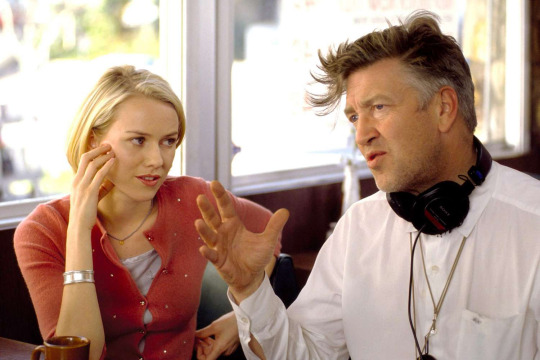
Naomi Watts and Lynch on Mulholland Drive
In the 00s, Lynch turned his attention to the dark side of Hollywood with another noir Mulholland Drive. Even more than the movie itself, I recall seeing it at the movies with a friend and his friend and afterwards us talking over drinks trying to make sense of what we just saw. Great movie, but tons of Lynch WTFery! Today, it is hailed as one of the greatest of this century. In 2006, he continued the themes of Hollywood's dark side with the underrated Inland Empire. He also broke the internet with his daily weather reports, where he read the day's weather in his unique voice.

Lynch as John Ford in The Fabelmans
Lynch's acting also deserves a mention. He did small parts in his own films, notably as FBI Chief Gordon Cole on Twin Peaks. In 2017, I interviewed John Carroll Lynch (no relation) about casting David Lynch in his directorial film Lucky and he said "It was entirely his love of Harry Dean Stanton." He also stole the entire film in Steven Spielberg's semi-autobiographical The Fabelmans, where Lynch played director John Ford. That John Ford scene is one of the greatest movie scenes with a filmmaker ever and Lynch brought it!
There have been a number of documentaries exploring the various interpretations and theories of Lynch's work including Blue Velvet Revisited and Lynch/Oz.


Lynch cover stories in EW and Rolling Stone
For me, he was one of the first directors that influenced me. As a teen, I gleaned over books, articles and interviews about him. It was one of the first times, I noticed that a director was on the cover of magazines, not just the cast. But more than that, it was his body of work. There was pure WTFery in his movies and it seemed like there was no story and it was a bunch of crazy stuff, but his movies were very well constructed, they were just structured in such a way to have some crazy out-there surrealism within those stories.
He was nominated for Oscars for directing Elephant Man (also nominated for writing), Blue Velvet and Mulholland Drive, but he only won an Honorary Award in 2020. Putting him in that club of directors like Hitchcock and Kubrick who also never won Oscars for directing. Lynch also recorded music (some were his own soundtracks) and his art work was exhibited in galleries and museums all over the world.
The obit from Variety can be read here!
#david lynch#rip#philamoca#peter wolf#eraserhead#dune#blue velvet#star wars episode vi: return of the jedi#rock and shock#twin peaks#twin peaks: fire walk with me#wild at heart#lost highway#the straight story#mulholland drive#inland empire#lucky#john carroll lynch#the fabelmans#steven spielberg#john ford#film geek
3 notes
·
View notes
Text
Laurie was made to love like this, she thinks. When Amy comes down with a cold before Christmas, Jo visits and Laurie hovers.
Title taken from the 2019 adaptation screenplay:
“Laurie studies her face, and we know that he sees her and loves her… They embrace with both their joy and their grief. This is the way it was meant. It is done.”
And though it's been many years since I read the book, and this fic primarily references the 2019 movie, the vibe very much fits with this bit from the conversation when Jo learns Laurie and Amy have gotten married:
“You'll go on as you begin, and Amy will rule you all the days of your life.”
“Well, she does it so imperceptibly that I don’t think I shall mind much. She is the sort of woman who knows how to rule well. In fact, I rather like it, for she winds one round her finger as softly and prettily as a skein of silk, and makes you feel as if she was doing you a favor all the while.”
—Louisa May Alcott, Little Women
(and yes, if you're wondering, this is essentially the narrative version of that post I made recently about Amy and Laurie and Jo and Friedrich and the differences in their dynamics)
2 notes
·
View notes
Text
Greta Gerwig’s innately sincere ability to craft profoundly therapeutic love letters to women will be an unmatched legacy someday. She’s already well on her way toward becoming a writer and director whose work is always admirable, sharp, and unforgettable. And as she does with the 2019 Little Women adaptation, Barbie is unlike anything viewers expect and everything they might not know they need.
The film was always going to be fun and clever—that much is clear from the trailers, but Greta Gerwig’s Barbie is a love letter to every little girl who grew up fighting something that feels insurmountable to conquer. It’s a bold, bright exploration of existential crises that seem relentless and the hope for something more. It’s a deeply relatable film on all fronts, topped with astute humor, an enamoring cast, beguiling production, a remarkable screenplay, and visionary directing. There are not enough words for a film of this delightful caliber with multiple angles to cover and explore. In every way that matters, Greta Gerwig’s Barbie is one of the best films of the year.
Continue Reading
31 notes
·
View notes
Text
instagram
revoltblacknews
There are moments at the Oscars. And then there are MOMENTS! You know, the ones that are so extra they deserve awards of their own! Here’s our countdown of the biggest, baddest and most unbelievable bits in the Academy Awards’ 96 year history. #9 Hattie McDaniel made history as the first Black Academy Award winner in 1939, taking home the Best Supporting Actress trophy for her role in “Gone with the Wind”. The venue had a strict no-Blacks policy, allowing McDaniel in as a “favor” but forced her to sit at a segregated table in the back. #8: Sidney Poitier became the first Black Best Actor Oscar winner for Lilies of the Field I963, nearly 25 years after Hattie McDaniel broke the racial barrier. #7: In one of the Oscar’s more poignant moments, both Denzel Washington and Sidney Poitier raised their Oscars for a figurative toast in 2002, with Denzel on-stage picking up a Best Actor trophy and Sidney in the audience clutching his Honorary Academy Award. #6: Proving that there’s really nothing she can’t do, Beyonce covered three of the Oscar-nominated songs in 2005, including “Vois Sur Ton Chemin’ which she sang in perfect French! #5: When Spike Lee took home his first Oscar for Adapted Screenplay for “BlacKkKlansman” in 2019, he jumped up on presenter Samuel L. Jackson and wrapped his legs around him and then got bleeped for dropping the F-bomb during his speech. #4: Halle Berry was sobbing so hard when she became the first Black woman to win Best Actress, she could barely get through her acceptance speech in 2002. #3: Warren Beatty announced “La La Land” as Best Picture winner by mistake in 2017—only to recant for the real winner “Moonlight”, a film about Black masculinity helmed by Black Director Barry Jenkins. #2: In 2003, Adrien Brody stunned presenter Halle Berry when he picked up the Best Actor trophy for his role in “The Pianist”, grabbing her face and planting a full-on kiss on her lips. #1: Cuba Gooding Jr was so ecstatic to win Best Supporting Actor for his role in “Jerry Maguire” in 1997, he literally jumped for joy during his acceptance speech and continued to shout out his thank you’s
#Instagram#Oscars#oscars 2024#the oscars#academy awards#black excellence#black culture#black people#black power#black tumblr
7 notes
·
View notes
Text
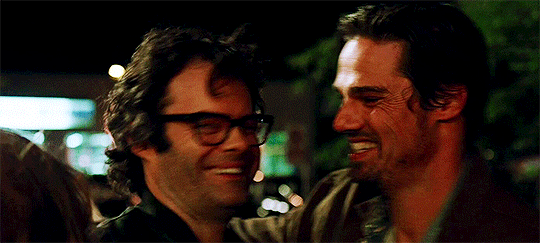
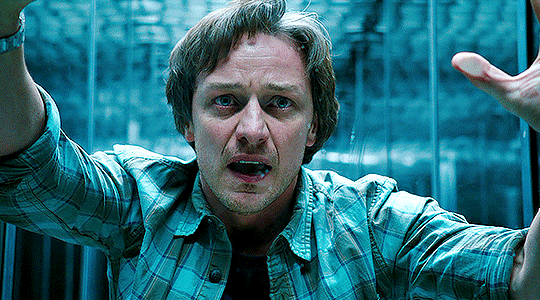
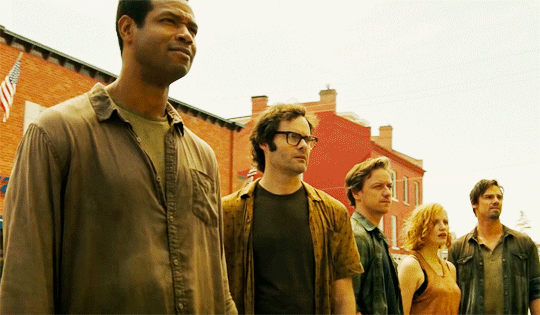
It: Chapter Two (2019, Andy Muschietti)
21/04/2024
#it chapter two#film#2019#andy muschietti#Film adaptation#It#stephen king#Sequel#2017#Derry#2016#homosexuality#Lung#bill denbrough#horror fiction#screenplay#stand up comedy#hypochondriasis#Architect#Businessperson#fashion#Suicide#paul bunyan#florida#roy lee#collider#new line cinema#sophia lillis#jessica chastain#finn wolfhard
4 notes
·
View notes
Photo

Blade runner poster framed Molding:Professional 1" Flat Top Black (solid-wood) Matte: 100% acid free board, Print: Full Color dry mounted glossy print Glass is included, Comes Fully Assembled Ready For Your Wall The double mat adds depth giving the display a unique "looking through a window'' appearance. The calendar print is bonded to foam core on a hot vacuum press. This bonding gives the print a perfect flat and smooth texture. This process also insures the print will never fold or fade with age or moisture. This wonderful display makes a thoughtful and original gift containing a classic vintage touch yet modern design, allowing it to fit alongside both modern and classic decor. BUY WITH CONFIDENCE. ALL OF MY DELICATE ITEMS ARE SHIPPED WITH A SPECIAL 3 LAYER PROTECTION SYSTEM. Blade Runner is a 1982 science fiction film directed by Ridley Scott from a screenplay by Hampton Fancher and David Peoples.[7][8] Starring Harrison Ford, Rutger Hauer, Sean Young, and Edward James Olmos, it is an adaptation of Philip K. Dick's 1968 novel Do Androids Dream of Electric Sheep? The film is set in a dystopian future Los Angeles of 2019, in which synthetic humans known as replicants are bio-engineered by the powerful Tyrell Corporation to work on space colonies. When a fugitive group of advanced replicants led by Roy Batty (Hauer) escapes back to Earth, burnt-out cop Rick Deckard (Ford) reluctantly agrees to hunt them down. Blade Runner initially underperformed in North American theaters and polarized critics; some praised its thematic complexity and visuals, while others critiqued its slow pacing and lack of action. The film's soundtrack, composed by Vangelis, was nominated in 1982 for a BAFTA and a Golden Globe as best original score. Blade Runner later became a cult film, and has since come to be regarded as one of the greatest science fiction films. Hailed for its production design depicting a high-tech but decaying future, the film is often regarded as both a leading example of neo-noir cinema and a foundational work of the cyberpunk[9] genre. It has influenced many science fiction films, video games, anime, and television series. It also brought the work of Dick to Hollywood's attention and led to several film adaptations of his works. In 1993, it was selected for preservation in the National Film Registry by the Library of Congress.
#nerd gift#sci fi decor#robots#blade runner#harrison ford#cyberpunk#cyber punk#futurism#cyberpunk poster#cyberpunk gift#science fiction gift#wall art
2 notes
·
View notes
Note
hiii alex!! i have so many numbers for you heheh 🤭 9 (though i don’t believe in guilty pleasures), 12, 16, 34, 38, 43 💖
omg loveee!! thanks for sending so many, you get me 🫶🫶
9. guilty pleasure movie?
i don’t really believe in guilty pleasures either! but i suppose the best answer for this is made-for-tv holiday romances. a perfect 90 minutes (2 hrs if you’re watching on tv with commercials) and they squeeze in so many predictable tropes that i made bingo cards for them several years ago. my family still uses them every year! so fun with hot chocolate, even better if you spike it with peppermint schnapps and make it a drinking game
12. subtitles or no subtitles?
subtitles, more often than not. it helps me absorb what i’m hearing more quickly and i like knowing i’ll never miss an important line
16. favorite book to film adaptation?
greta gerwig’s little women (2019). little women was one of my all-time favorite books growing up, and greta breathed such life into it. she clearly loves the source material so much, and i thought the structural changes she made were such a fresh take. i really didn’t think i could love the story any more and then this version came along and it was everything i could have hoped and wished for 🥲 i owe her my life
34. which film is the most visually beautiful?
if beale street could talk (2019) is maybe the prettiest film i’ve ever seen and the score is so good it’ll take your breath away. i also was so pleasantly taken aback by the taste of things (2023). the food and the love and the warmth in that film is so gorgeous. maybe a bit more basic, but i also love the cinematography of most of denis villeneuve’s films. actually beautiful might not be the right word, maybe striking is what i’m looking for? he’s so good at capturing sweeping, epic scale in a way that makes you as the viewer feel so small. it’s really impressive
38. in your opinion that is the most overrated movie?
promising young woman (2020). holy shit, i hated that movie. i thought it was one of the worst written films i’d ever seen and it won the oscar for best original screenplay. unbelievable
43. what movie do you quote the most?
gotta be mean girls (2004)…so much of that film has just been fully absorbed into my everyday vernacular that i almost don’t even realize when i’m quoting it. tbh that’s probably true for most people my age, but yeah. that’s the one
———
this was so fun ✨
ask me about movies!!
3 notes
·
View notes
Text
'The trailer and release date for Ripley have been revealed, previewing the upcoming Netflix thriller. The project was first announced in 2019 and was originally planned for Showtime as a television adaptation of Patricia Highsmith's seminal Tom Ripley novels. Andrew Scott, known for his performances in Fleabag as the Hot Priest, in Sherlock as Moriarty, and his acclaimed performance in the 2023 drama All of Us Strangers, was cast in the lead role of Tom Ripley.
Netflix has unveiled the trailer for Ripley, which will premiere on April 4...
In the moody monochrome preview, Tom Ripley is the name on everyone's tongue. But there are also hints that the familiar character, now played by Scott, leads a dangerous life that may well lead to ruin. The trailer also reveals John Malkovich has been cast. Previously, Malkovich played Tom Ripley in the 2002 film Ripley's Game.
What To Know About Netflix's Ripley Show
The eight-episode drama begins with Tom Ripley as he's just getting by in his average con artist ways. Set in early 1960s New York, the titular character is hired by a wealthy man to convince his son, Dickie Greenleaf (Stardust and Emma actor Johnny Flynn) to return home from Italy. But the allure of Dickie's lifestyle and his seemingly perfect romance with the suspicious Marge Sherwood (The Equalizer 3 star Dakota Fanning) tempts Ripley. He goes to extreme lengths to maintain his place next to Dickie, which eventually devolves into deceit, fraud, and murder.
The new Netflix miniseries hails from Steven Zaillian, who wrote and directed every episode. He's contributed to some of Hollywood’s most influential movies, winning an Oscar for the screenplay of Schindler’s List as well as writing on Scorsese's Gangs of New York and The Irishman. Zallian also wrote and directed on HBO's acclaimed limited series The Night Of, with Ripley being his second foray into TV.
The drama, which also stars musician and No Time to Die actor Eliot Sumner, moved to Netflix from Showtime earlier this year after Netflix execs viewed footage of the show. With nods to the overall Ripley franchise, a notable writer, and a talented cast, the series could be a big hit with audiences and at awards ceremonies.'
#Ripley#Netflix#The Night Of#Martin Scorsese#Gangs of New York#Schindler's List#Eliot Sumner#Andrew Scott#Dakota Fanning#Fleabag#Hot Priest#Sherlock#Moriarty#All of Us Strangers#Ripley's Game#John Malkovich#Patricia Highsmith#Dickie Greenleaf#Johnny Flynn#Marge Sherwood#Steven Zaillian
6 notes
·
View notes
Note
hiiii omg i saw ur a film nerd in ur about me post and so am i !! whats ur favourite movie/s :P
hello!!! and yes omg i always LOVE answering this question lmao so first and foremost:
my letterboxd top 4 <3 !

( explanations and honorable mentions under the cut ! )
1. little women (2019)
watched it with three of my best friends when it first was in theaters so that definitely added to the message and experience watching it. i love how greta gerwig directed the sister dynamic. she’s gone on record on interviews and also if you can find the screenplay itself that in the script the actors’ lines were written on top of one another to reflect the spontaneity and chaos of sisterhood and family through the film’s dialogue. so genius?!?! this adaptation just felt so real and genuine and i also see a little of myself in all the sisters 🫶
2. challengers
UGH i did like a whole deep dive here but in short: luca guadagnino you absolute mastermind. i love tennis, i love colorgraded film and photography, i love hot people!!!! story was insane, i quite literally had to sit in my car for like half an hour just processing when i got out the movie house before i felt normal enough to drive home lol.
3. emma (2020)
again i did a thorough tedtalk on this one. but i’m a big jane austen fan!!! and the aesthetics and score on this adaptation were just off the charts and so so lovely. love the regency era and i think they translated it to screen in a very appealing and classic (although maybe not entirely historical but hey it’s art) way. i’ll always come back to it as my comfort movie ngl.
4. call me by your name
amazing story. (not a love story mind you!!!) which is actually why it stuck with me sm bc i went in with my hopeless romantic self just to be fuckin crushed. watched it two summers ago and it took me like weeks to recover, it broke my heart in a way that felt so good. also just a downright beautiful film all around (colorgrade, cinematography, acting, music, everything!!). in guadagnino we trust!!!
honorable mentions:
watching the detectives (!!!)
lucy liu and cillian murphy? ummm FUCK YES? my ABSOLUTE FAVORITE in the romcom genre to date. they just match each other’s freak. and the whole movie is abt being film nerdy and awkward and weird and manic pixie dream girl and like lowk…. so ro-core fr!
shape of water
ok don’t call me a freak, it was pretty interesting— from the aesthetics, to the minimal dialogue, to the overall story. it’s a doozy but imo that shit was art. (or guillermo del toro was the real freak all along)
spirited away
my fav ghibli film bc it’s just so haunting in a way none of the other ghibli films are and i like that. like the way some of those characters were drawn was lowk gross—but i find that kinda gnarly. so over the top fantastical it makes my brain tingle in a certain way.
isle of dogs
my fav wes anderson film in both stop motion or live action (my fav live action of his was the most recent asteroid city tho!). truly art and has such a heartwarming story but at the same time the DRAMA. my lord. crazy how captivating the story was even if half of it was in largely unsubtitled japanese—unique choice but i actually liked what it added to the movie a lot especially considering the movie’s pov from an english-speaking dog. i’m actually a big cat person but i finished that movie so convinced that fuck yeah that dog is man’s bsf right there
the amazing spiderman movies
andrew garfield’s spiderman is my fav <3 but also i love the darker feel to this version of spiderman. maybe it’s bc i’m also a big batman/dc fan (sorry my marvel babes </3) and generally those movies have been handled with a more dark tone. but nonetheless andrew garfield is hot too so that’s a plus!
cruella
i’m lowk a disney hater but this movie was SO. CUNTY. fuck i loved it. the actors were amazing and the visuals and the FASHION were just mwah, especially compared to other disney live action films (😭).
maleficent & maleficent: mistress of evil
AGAIN, SO FUCKING CUNTY even if i’m a reluctant disney enjoyer. i watched the first installment when i was real young but in 3d at the movie house. SO COOL. watched the second one with my mom at home. IMMEDIATELY WATCHED IT AGAIN. angelina jolie is maleficent, n i love how these movies characterize the villain in such a genuinely human way i don’t think anyone could’ve seen coming when these babies first came out.
ok thats it finally 💋

#🍡 𝗮𝘀𝗸𝗯𝗼𝘅#🪴 𝗿𝗼 𝗿𝗲𝗰𝗼𝗺𝗺𝗲𝗻𝗱𝘀 !#🍃 𝗿𝗼 𝗴𝗲𝘁𝘀 𝗳𝗶𝗹𝗺 𝓯𝓻𝓮𝓪𝓴𝔂#this is probably more than you were expecting 😭#but if you want like my immediate recs#it’s my top 4 <3
5 notes
·
View notes
Text
Dead Dead Demons Dededede Destruction: the Japanese manga series you need to watch

Dead Dead Demon's Dededede Destruction is an upcoming anime adaptation of the popular manga series of the same name by Inio Asano. The story follows two high school girls, Koyama Kadode and Nakagawa "Ontan" Oran, as they navigate life in a dystopian world threatened by a mysterious alien mothership hovering above Tokyo.

The anime will be released in two parts: 1)A two-part film adaptation directed by Tomoyuki Kurokawa, with a screenplay by Reiko Yoshida, character designs by Nobutaka Ito, and music composed by Taro Umebayashi. The first part premiered in Japanese theaters on March 22, 2024, while the second part is set to release on May 24, 2024. 2)An 18-episode original net animation (ONA) series edition that will stream worldwide on Crunchyroll starting May 24, 2024. This series will feature new footage not shown in the film adaptation. The anime features a talented voice cast, including Ikuta Lilas as Koyama Kadode and Ano as Ontan. Ikuta is a singer-songwriter and vocalist of the popular music group Yoasobi, while Ano is a versatile voice actor. Despite the impending alien threat, the two main characters try to maintain normalcy in their lives. However, as they grow up, they face complex questions about adulthood and the true nature of the danger they face. The manga, published by Shogakukan from 2014 to 2022, has been well-received, with over three million copies in circulation. It was recognized as one of the best new manga at the 2018 San Diego Comic-Con and was nominated for an Eisner Award in 2019. With its unique blend of dystopian sci-fi and coming-of-age themes, Dead Dead Demon's Dededede Destruction promises to be an engaging and thought-provoking anime series for fans of the manga and newcomers alike.
2 notes
·
View notes